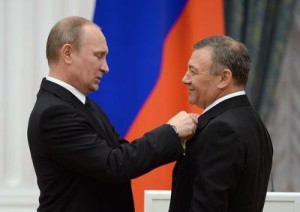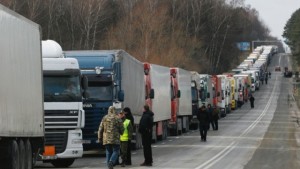
Mass protests by truck drivers against a new road tax are taking place in many Russian regions. According to a new law that came into effect on November 15, drivers of all trucks weighing 12 tons or more have to pay 1.5 rubles (3.73 rubles after March 2016) per each kilometer of federal highways, meaning that one trip costs each heavy goods vehicle around 10,000 to 15,000 rubles, considering the enormous distances they have to cover. It is worth mentioning that half of all trucks in Russia are owned by individual entrepreneurs who earn around 50,000 rubles, give or take, per one trip, and new dues can bring them to the brink of bankruptcy.
In 2010, Russian Transportation Minister Igor Levitin, whose name in recent years has been connected with Putin’s friends the Rotenberg brothers, suggested the reintroduction of road funds eliminated in 2001. At the time, the reason for disposing with the road funds was political. Thievery connected with road construction was thriving while the regime was building the gubernatorial corps into the vertical of power, and so it had to be deprived of opportunities for corruption. By 2010, when the vertical of power had been completed and gubernatorial elections had been done with, the regime realized that road construction could help overcome the economic crisis. However, the budget could not provide for this new venture.
The idea took a long time to get implemented. Amendments to the Russian Budget Code were adopted as late as in 2011, and the payment system on federal highways was supposed to come into effect in 2013. The decision was made under the guidance of then-Prime Minister Putin who in March 2012 ran for president under the slogan of doubling the amount of road construction over the period of ten years. However, in late 2012, President Putin postponed the beginning of road tax collection until November 2014 because the government simply had not had enough time to work out the payment mechanism and the Economic Development Ministry believed that tariffs calculated by the Transportation Ministry were not transparent. Moreover, the whole venture lacked an influential “interested party” among Putin’s close circle willing to promote the implementation of the decision.
In 2014, the Rostech’s Chief Executive Sergei Chemezov became such a lobbyist. He convinced the government that, in the context of the recent import substitution trend, his state corporation was capable of implementing a payment system based on Russian technologies. Indeed, this task was entrusted to Rostech without the required tender. The RT-Invest Transport Systems (RTITS) company was established, with Rostech initially owning its controlling stake. Later, however, control was ceded to the company of Igor Rotenberg, the son of Boris Rotenberg. Incidentally, the 25 billion ruble credit for the realization of the project was issued by Gazprombank, where another son of Boris Rotenberg is serving as an advisor to its chairman. Now the RTITS company will collect the payments for trips on federal highways amounting to some 50 billion rubles per year, 10 billion of which will go to the company itself for its services.
 Long-haul truckers have taken a tough stance. First, the payment collection system is not functioning properly: the government had to concede and cancel penalties for non-payment. Secondly, truckers consider the new “tax” to be unfair: they are already paying the transport tax and gasoline excise-duty. Thirdly, why should the son of a Putin friend be the beneficiary? Truckers have already called the payment system a “Rotenberg noose,” and their protests are acquiring a personified character: for the first time in Putin’s Russia, they are being directed against a close associate of the president. The results are as follows: nearly 10 percent of stores have received less supplies. The inflationary effect could amount to an extra 1.5 percent a year. Add to this the risk of bankruptcy for transporters. People will pay for this with higher prices of goods, and businesses will pay with higher transportation costs. The clear winners are the Rotenberg family, where Igor Rotenberg is in charge of payments collection, Roman Rotenberg provides the credit, and Arkady Rotenberg constructs roads. And this situation will continue while the Rotenbergs retain their principal “asset”–Vladimir Putin as president of the country that he has given them for plunder.
Long-haul truckers have taken a tough stance. First, the payment collection system is not functioning properly: the government had to concede and cancel penalties for non-payment. Secondly, truckers consider the new “tax” to be unfair: they are already paying the transport tax and gasoline excise-duty. Thirdly, why should the son of a Putin friend be the beneficiary? Truckers have already called the payment system a “Rotenberg noose,” and their protests are acquiring a personified character: for the first time in Putin’s Russia, they are being directed against a close associate of the president. The results are as follows: nearly 10 percent of stores have received less supplies. The inflationary effect could amount to an extra 1.5 percent a year. Add to this the risk of bankruptcy for transporters. People will pay for this with higher prices of goods, and businesses will pay with higher transportation costs. The clear winners are the Rotenberg family, where Igor Rotenberg is in charge of payments collection, Roman Rotenberg provides the credit, and Arkady Rotenberg constructs roads. And this situation will continue while the Rotenbergs retain their principal “asset”–Vladimir Putin as president of the country that he has given them for plunder.





